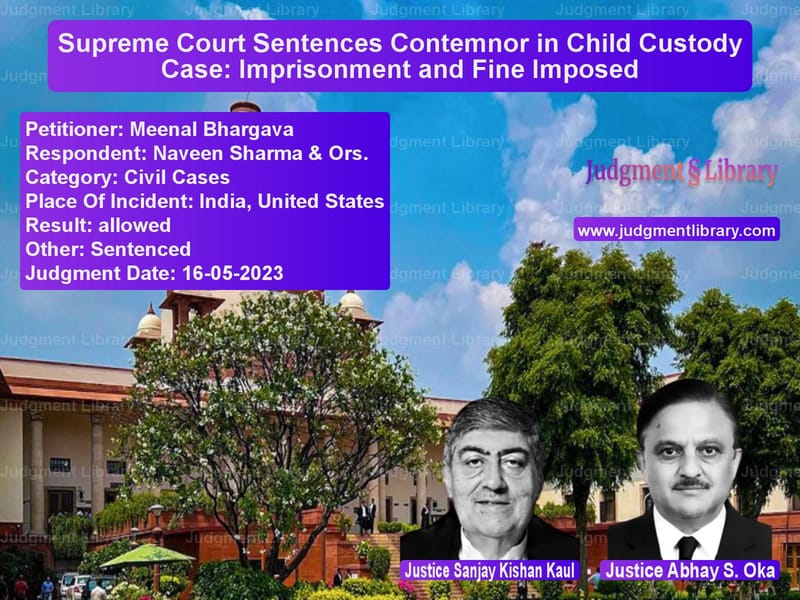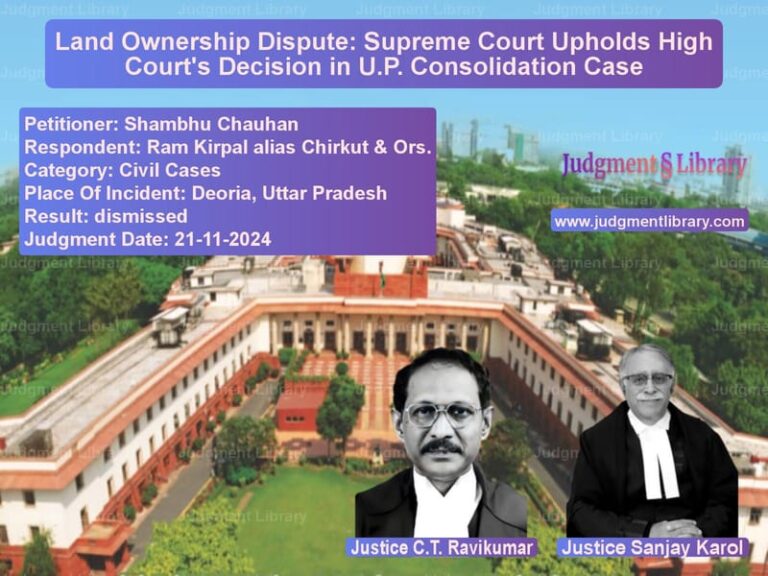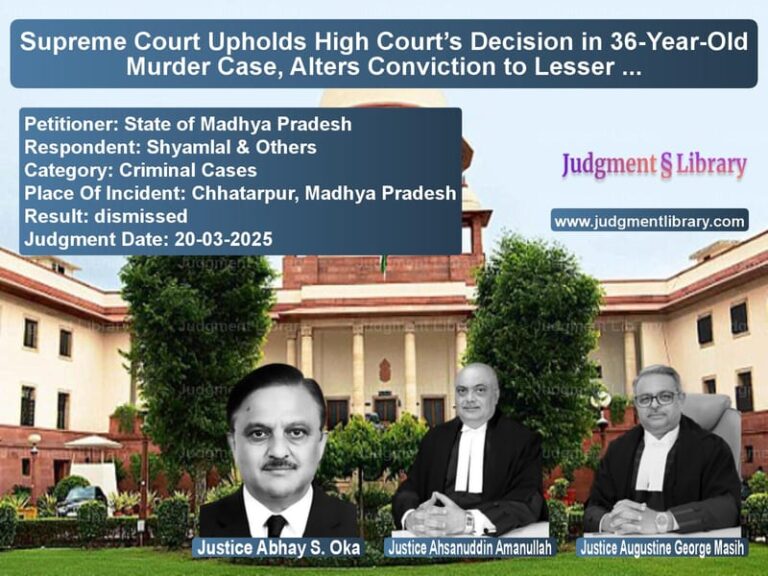Supreme Court Sentences Contemnor in Child Custody Case: Imprisonment and Fine Imposed
The Supreme Court of India recently passed a significant judgment in a contempt case related to a child custody dispute between Meenal Bhargava and Naveen Sharma. The contemnor was held guilty of contempt for failing to comply with court orders to return the child to India. The Court imposed a six-month imprisonment sentence along with a fine of Rs. 25 lakhs, highlighting the importance of adherence to judicial directives.
Background of the Case
The contempt case arose from a long-standing legal battle over child custody. The Supreme Court had earlier ruled that the child, who was taken to the United States by the contemnor, must be brought back to India by July 1, 2022. However, despite repeated court orders and undertakings given by the contemnor, he failed to comply.
In its judgment on January 16, 2023, the Court had already held the contemnor guilty of contempt. However, before deciding on the sentencing, the Court provided an opportunity for the contemnor to rectify his actions. Unfortunately, the contemnor did not show any intention of complying with the court’s orders, leading to the sentencing phase.
Arguments Presented
Petitioner’s Arguments
The petitioner, represented by senior counsel, argued:
- The contemnor had consistently defied Supreme Court orders and showed no willingness to comply.
- The contemnor had also misrepresented facts before foreign courts to avoid enforcement of Indian court rulings.
- Despite being given multiple opportunities, the contemnor had made no attempts to bring the child back to India.
- His actions amounted to not only civil contempt but also criminal contempt, warranting strict legal action.
Respondent’s (Contemnor’s) Arguments
The contemnor’s counsel attempted to justify his actions, stating:
- The contemnor acted in the best interests of the minor child and had sought intervention from courts in the United States.
- A forensic investigation was ongoing in the United States related to alleged abuse of the child while in India, and bringing the child back would not be in his best interest.
- The Guardian Ad Litem appointed by the U.S. courts had taken over legal responsibility for the child’s welfare.
- He had faced legal and procedural barriers in renewing the child’s passport, further preventing compliance with the Indian court’s orders.
Supreme Court’s Judgment
The Supreme Court, after reviewing the case, found that the contemnor had engaged in continuous defiance of its authority. The key observations included:
- “The contemnor has shown scant respect for the Orders of this Court.”
- “Despite being given multiple opportunities to make amends, the contemnor has failed to show any remorse.”
- “He has acted contrary to the statements made before this Court and has misrepresented facts in foreign courts.”
- “The contemnor deliberately sought to delay compliance under the pretext of foreign legal proceedings.”
- “His actions amount to both civil and criminal contempt, warranting strict punitive action.”
Sentencing and Directives
Considering the gravity of the contemnor’s actions, the Supreme Court issued the following directives:
- The contemnor is sentenced to undergo six months of simple imprisonment.
- A fine of Rs. 25 lakhs is imposed, payable within six months. In case of default, an additional two months of simple imprisonment will be imposed.
- The fine amount, once deposited, is to be transferred to the petitioner for the welfare of the minor child.
- The Government of India and the Central Bureau of Investigation (CBI) are directed to take all possible steps to ensure the contemnor’s presence in India so that he undergoes the sentence and pays the fine.
- The case is to be listed in the first week of August 2023 to review compliance with the orders.
Legal Implications of the Judgment
This ruling has significant implications for child custody cases and contempt proceedings in India. The Supreme Court has reinforced the principle that non-compliance with court orders, especially in matters involving minors, will not be tolerated. The key takeaways include:
- Upholding Judicial Authority: The Court’s strict approach sends a strong message that judicial orders must be followed, and failure to do so will result in severe consequences.
- International Jurisdiction Conflicts: The case highlights the challenges faced in cross-border custody disputes and the complexities involved in enforcing Indian court orders abroad.
- Criminal Liability for Contempt: The Court’s decision to treat this as both civil and criminal contempt underscores the seriousness of willful disobedience.
Conclusion
The Supreme Court’s judgment in this case serves as a landmark ruling in contempt law and child custody disputes. By imposing both imprisonment and a heavy fine, the Court has set a precedent for dealing with individuals who defy judicial orders. Moving forward, compliance with legal obligations in family disputes, particularly those involving international dimensions, will be crucial in ensuring justice for all parties involved.
Petitioner Name: Meenal Bhargava.Respondent Name: Naveen Sharma & Ors..Judgment By: Justice Sanjay Kishan Kaul, Justice Abhay S. Oka.Place Of Incident: India, United States.Judgment Date: 16-05-2023.
Don’t miss out on the full details! Download the complete judgment in PDF format below and gain valuable insights instantly!
Download Judgment: meenal-bhargava-vs-naveen-sharma-&-ors.-supreme-court-of-india-judgment-dated-16-05-2023.pdf
Directly Download Judgment: Directly download this Judgment
See all petitions in Contempt Of Court cases
See all petitions in Child Custody
See all petitions in Other Cases
See all petitions in Judgment by Sanjay Kishan Kaul
See all petitions in Judgment by Abhay S. Oka
See all petitions in allowed
See all petitions in Sentenced
See all petitions in supreme court of India judgments May 2023
See all petitions in 2023 judgments
See all posts in Civil Cases Category
See all allowed petitions in Civil Cases Category
See all Dismissed petitions in Civil Cases Category
See all partially allowed petitions in Civil Cases Category







